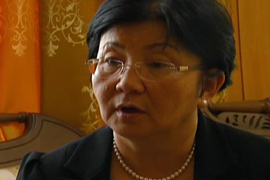Uzbeks return amid Kyrgyzstan fears
Thousands who fled violence start returning, but many others wait to see if security improves.

Others are worried about returning to Kyrgyzstan because they fled their homes in a rush and do not have identity papers.
However, Al Jazeera’s Clayton Swisher, reporting from southern Kyrgyzstan, said thousands of refugees made the journey back across the border on Sunday. Many of the returnees were women and children who said they were treated well in Uzbekistan.
Referendum on schedule
Meanwhile, Kyrgyzstan’s interim government is pressing ahead with a national referendum on a new constitution, scheduled for June 27 – despite warnings from many Kyrgyz politicians, and foreign diplomats, that it should delay the vote.
 Rosa Otunbayeva, the Kyrgyz president, still plans to go ahead with the June 27 referendum
Rosa Otunbayeva, the Kyrgyz president, still plans to go ahead with the June 27 referendumThe government wants to encourage refugees to return before the vote, which will not be viewed as legitimate without Uzbek participation.
But Al Jazeera’s Robin Forestier-Walker reporting from Bishkek, the Kyrgyz capital, said many Uzbeks were reluctant to return before the referendum.
“With allegations of abuses and collusion by the military… it’s very difficult to see how the government can win back the population’s trust,” he said.
Another obstacle to carrying out the referendum is the state of emergency in the southern city of Osh and nearby towns and villages. The emergency was first imposed on June 11 and was due to expire on Sunday. It, however, has now been extended until June 25.
Many Uzbek neighborhoods in southern Kyrgyzstan were burnt to the ground last week by mobs of ethnic Kyrgyz. Nearly half of the region’s 800,000 Uzbeks are believed to have fled across the border.
‘Orchestrated violence’
Roza Otunbayeva, the interim Kyrgyz president, said that as many as 2,000 people may have been killed in the clashes.
The Kyrgyz president has acknowledged the death toll may be far higher than first thought
Victims of the unrest say the violence was a brutal and orchestrated campaign targeting Uzbeks, who make up 14 per cent of Kyrgyzstan’s population of 5.3 million.
Otunbayeva’s government has blamed the violence on supporters of Kurmanbek Bakiyev, the former president, who was ousted following street protests in April.
The United Nations has said the unrest appeared to have been orchestrated, but has stopped short of assigning blame.
Robert Blake, the US assistant secretary of state for South and Central Asian affairs, said he had been promised by authorities that they would investigate the causes of the violence.
“Such an investigation should be complemented by an international investigation by a credible international body,” Blake said on Saturday.
“Is it important for the provisional government to establish an atmosphere of trust and security so the refugees in Uzbekistan and the internally displaced persons in Kyrgyzstan can feel confident that they can return to their homes.”
The call for a probe came as Kyrgyzstan prosecutors charged Azimzhan Askarov, the head of a prominent human rights group, with inciting ethnic hatred.
Askarov was charged for shooting a video of unarmed Uzbeks gathering to defend their town during the attacks.
Askarov had accused the military of complicity in the violence.
Tursunbek Akun, the country’s rights ombudsman, insisted the charges against Askarov were fabricated, and activists in the capital, Bishkek, demonstrated in front of UN offices to demand his release.